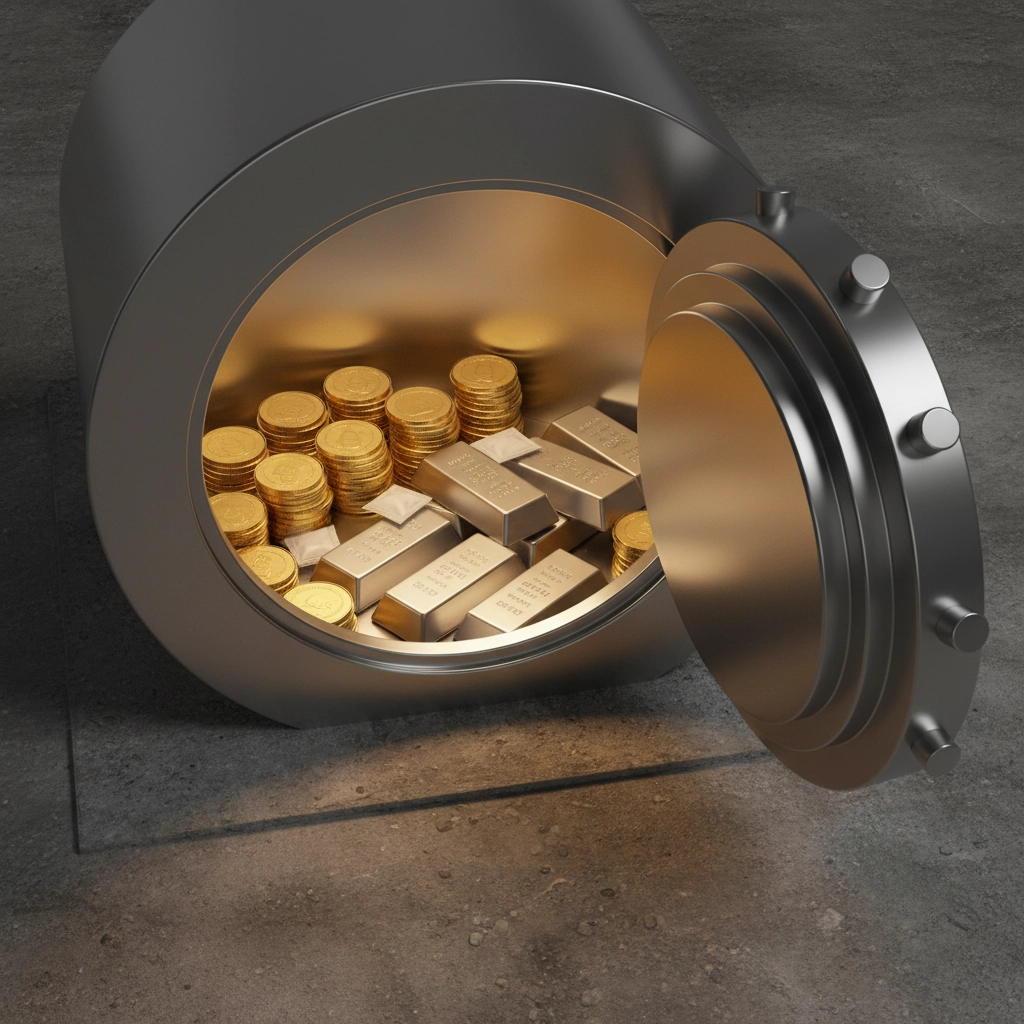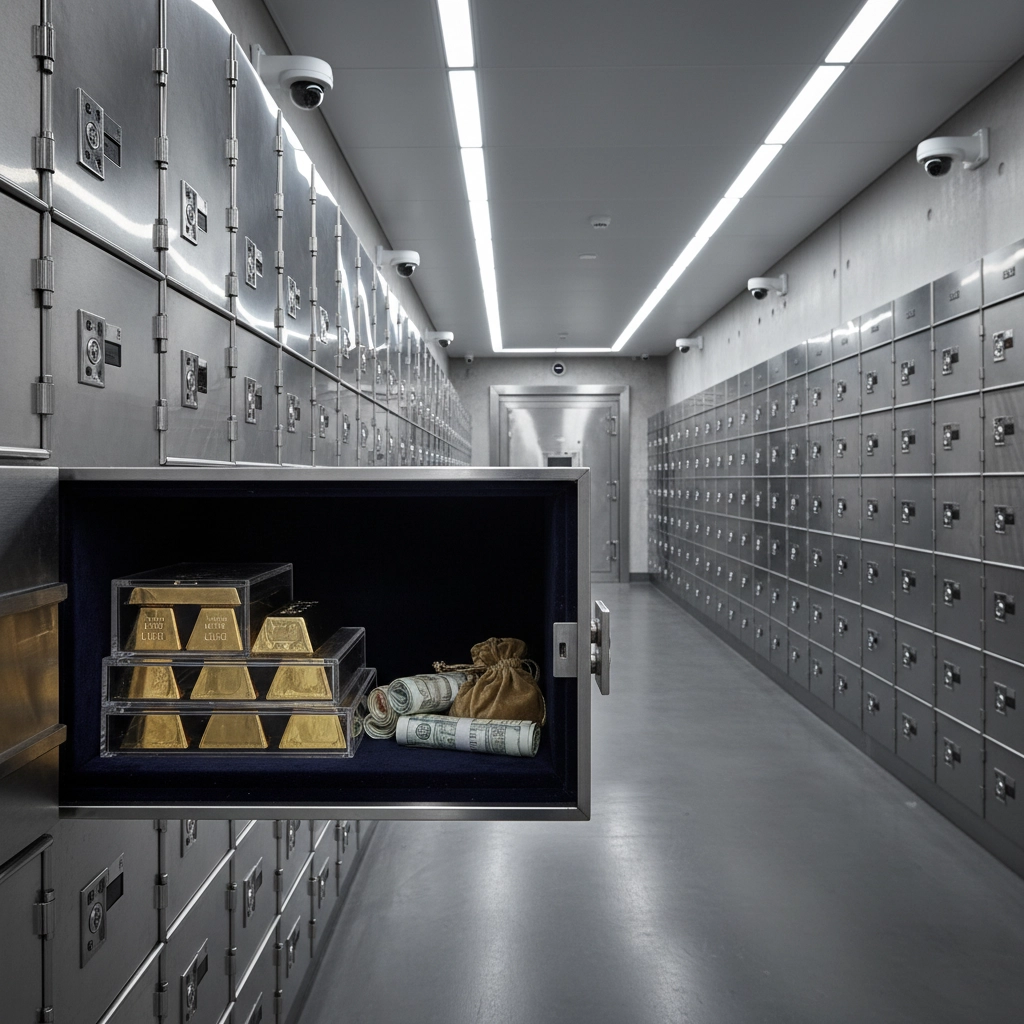You've made the smart move and started building your precious metals portfolio. But now comes the million-dollar question: where should you actually store your gold and silver? Whether you're holding a few coins or building a serious stack, the way you store your bullion can make or break your investment.
Let's be honest – there's no one-size-fits-all answer here. Some folks sleep better knowing their metals are locked away in a professional vault, while others want their gold within arm's reach. Both approaches have their merits and their pitfalls, and the choice often comes down to your specific situation, the size of your holdings, and how you balance security against accessibility.
Home Storage: Your Castle, Your Rules
The Smart Moves (The Dos)
Invest in a rock-solid safe. We're not talking about the kind you can pick up at a big-box store. You need a heavy-duty, fire-resistant safe that's either bolted to the floor or embedded in concrete. Think of it as the fortress protecting your financial future. Floor safes that are built into concrete slabs offer some of the best protection for larger quantities.
Keep it cool and dry. Precious metals hate moisture like vampires hate sunlight. Store your bullion in a cool, dry environment and consider using moisture-absorbing packets or a dehumidifier. This is especially crucial for silver, which can tarnish when exposed to humidity and sulfur compounds in the air.
Practice the art of secrecy. The fewer people who know about your bullion stash, the better. Keep your mouth shut about your holdings – even with close friends and family. However, make sure at least one trusted person knows the location and access details for emergencies. You don't want your heirs hunting for treasure maps.
Get proper insurance coverage. Here's a wake-up call: most homeowner's insurance policies either don't cover precious metals or have laughably low limits. You'll likely need specialized coverage to protect your investment properly. It's not cheap, but it's a lot cheaper than losing your entire stack to theft or disaster.

Use the right storage supplies. Individual coins deserve coin capsules, multiple coins of the same size fit nicely in tubes, and larger quantities call for monster boxes. These aren't just fancy containers – they prevent scratches, moisture damage, and contamination that could hurt your metals' resale value.
Handle with care (or better yet, don't handle at all). Every time you touch your bullion, you risk leaving fingerprints, oils, or scratches. If you must handle your pieces, wear cotton gloves and minimize contact.
The Rookie Mistakes (The Don'ts)
Don't mix your metals. Storing gold and silver in direct contact with each other is a recipe for tarnishing and damage. They need their personal space, just like roommates who don't get along.
Don't advertise your wealth. Posting photos of your stack on social media or bragging about your holdings at the local coffee shop is like putting a "Rob Me" sign on your front door. Keep your success to yourself.
Don't store documentation with the physical metals. Certificates, receipts, and other important papers should live in a separate secure location. If someone gets to your bullion, you don't want them getting your paperwork too.
Don't overlook creative hiding spots. If a traditional safe isn't in your budget yet, consider options like attics, spaces below floorboards, inside furniture, or behind appliances. Just make sure these locations stay dry and stable. Some long-term holders even bury their metals in waterproof containers on their property – though this comes with its own risks.
Vaulted Storage: The Professional Approach
The Smart Moves (The Dos)
Choose your vault partner wisely. Not all storage facilities are created equal. Look for reputable services that offer comprehensive insurance covering the full replacement value of your metals, 24/7 monitoring, armed security, and strict access controls. These aren't corner-cutting areas.
Audit your holdings regularly. If you can't see it, touch it, or verify it exists, how do you know it's really there? Legitimate vault services should allow periodic auditing or verification of your holdings. Don't be shy about exercising this right.
Understand the fee structure completely. Storage fees, insurance costs, transportation charges, handling fees – they all add up. Make sure you understand exactly what you're paying for and budget accordingly. Some services have hidden fees that only surface when you try to access your metals.
Consider professional storage for significant holdings. Once your precious metals portfolio hits the $50,000+ range, or if you travel frequently and can't secure your home properly, professional storage starts making a lot more sense.

The Costly Mistakes (The Don'ts)
Don't ignore the ongoing costs. Monthly or yearly storage fees might seem small at first, but they compound over time. Run the numbers to see how these fees will impact your long-term returns, especially if gold and silver prices remain flat for extended periods.
Don't forget about accessibility limitations. Want to grab a few coins for a weekend coin show? With vault storage, you'll need appointments, advance notice, and sometimes waiting periods. Your metals aren't exactly at your fingertips anymore.
Don't underestimate the trust factor. You're putting your faith – and your wealth – in someone else's hands. Do your homework on the company's reputation, insurance coverage, and track record. Remember, even professional storage facilities aren't immune to internal theft or business failures.
The Head-to-Head Breakdown
| Factor | Home Storage | Vaulted Storage |
|---|---|---|
| Security | Depends on your safe and security system | Professional 24/7 monitoring and armed guards |
| Cost | One-time safe purchase, ongoing insurance | Monthly/yearly fees plus insurance |
| Access | Immediate anytime access | Appointment-based, business hours |
| Insurance | Often limited coverage, requires special policies | Typically comprehensive, full replacement value |
| Privacy | Complete anonymity | Requires trust in third-party |
| Natural Disasters | Vulnerable to floods, fires (depending on safe) | Professional disaster protection |
| Convenience | Total control over your schedule | Formal processes and wait times |
Finding Your Storage Sweet Spot
Home storage makes sense when:
- Your holdings are modest (under $50,000)
- You need quick access to your metals
- You can install proper security measures
- You value complete privacy and control
- You want to avoid recurring fees
Vaulted storage works better when:
- You're holding significant quantities
- You travel frequently or lack home security
- You want maximum insurance protection
- You're thinking long-term storage (10+ years)
- Peace of mind is worth the ongoing costs
The Hybrid Approach: Best of Both Worlds
Here's what many seasoned investors do: they diversify their storage strategy. Keep some metals at home for quick access and emergency situations, while storing the bulk of their holdings in professional facilities. This gives you both immediate availability and maximum security for your larger investment.
At Bullion Fortune, we understand that storage decisions are as personal as investment choices. Whether you're planning to store at home or in a vault, we're here to guide you through the process. Our team can help you understand the pros and cons of each approach based on your specific situation and investment goals.
Ready to build your precious metals portfolio systematically? Consider our unique recurring purchase program – you can set up automatic monthly purchases of gold or silver (like 2 coins every month) to dollar-cost average your way into the market while you figure out your ideal storage solution.
Call us today to learn more about our storage guidance and recurring purchase options. Let's make sure your precious metals investment strategy works for your lifestyle and long-term financial goals.








Leave a comment